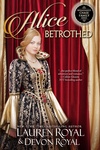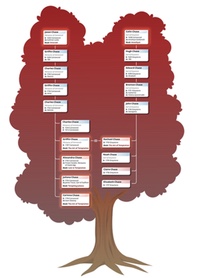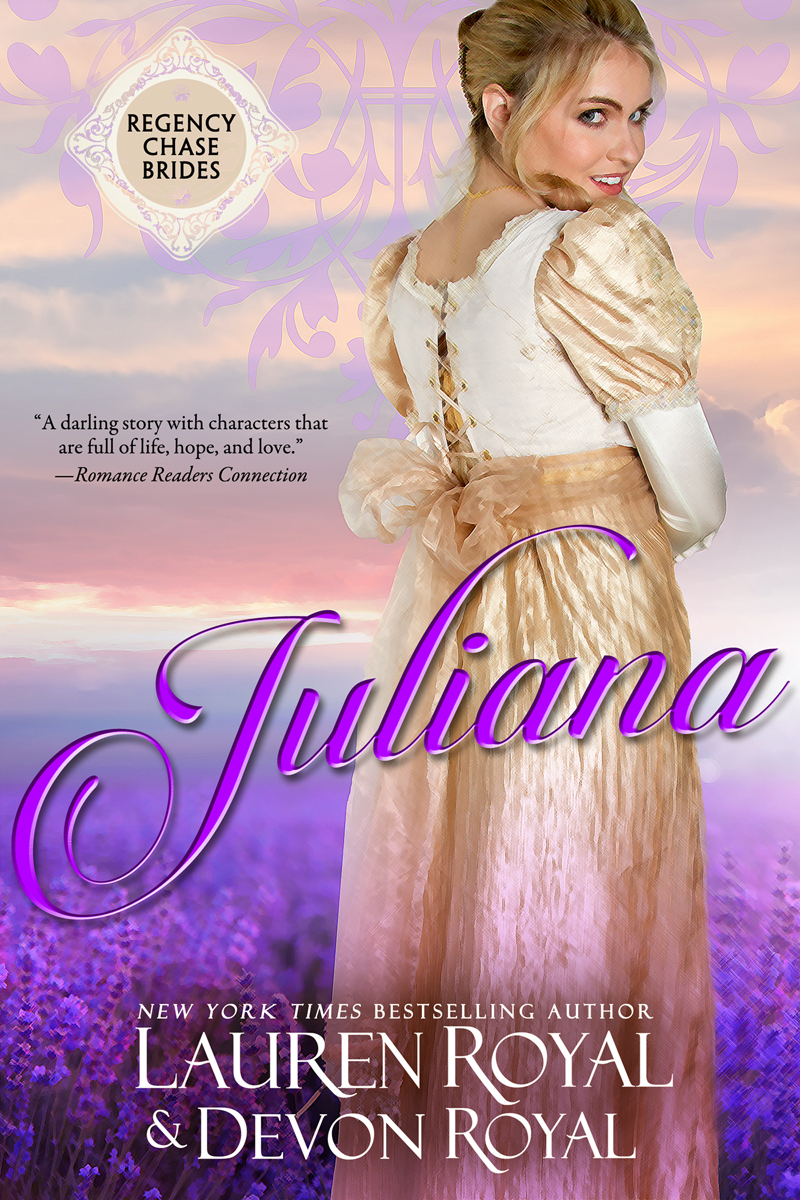Juliana (2 page)

Renaissance Chase Family Series

Not gonna lie, I thought it was pretty cool growing up with an author for a mom! I’d always been into books (like, every morning when 1st grade reading time ended, Mrs. Schultz had to physically pry the book from my hands), plus there were perks. Mom was always home with us kids, so we never had to go to daycare. She was also always on deadline, so we got to eat a lot of Pizza Hut for dinner. And I could impress my friends by moseying into Barnes & Noble and casually pointing out my mom’s books on the shelves.
The only problem: I wasn’t allowed to read them!
Her romance novels were for and about adults, and I was just a kid. A kid who loved books and hated rules—so you can imagine my dismay.
Of course, the instant I was old enough, I swiped a full set of her books from the garage and devoured them all in a row. And I wasn’t surprised when I loved every one, because, you guys, my mom is seriously awesome.
Recently the aforementioned awesome lady had an awesome idea: releasing new, revised versions of her novels geared at a young adult audience, so that people of all ages can enjoy them. To think, all those dismay-ful years could have been avoided!
I knew instantly I was the girl for the job. My mom and I have been writing together basically since I learned how to type—our first all-new YA release,
Alice Betrothed
, is a project we started when I was in middle school—plus, I was a real live teenager myself only a few years ago. I’ve got the embarrassing pictures to prove it.
There’s a crazy amount of fantastic YA and romance out there right now—we’re SO excited that you’ve chosen our book! Like, spontaneous-dance-party-excited! I would be doing the robot right now if I weren’t busy typing. Maybe I’ll wrap up this letter so I can go do that.
I so hope you’ll enjoy Juliana’s story!
xoxo
 June 2015
June 2015

To see the Regency Chase Family Tree,
click here
!

For our Chase Family Readers’ Group.
With our everlasting thanks for all of your support!

The Foundling Hospital, London
Saturday, June 8, 1816
LADY JULIANA
Chase’s sisters often accused her of looking for trouble. Of sticking her nose where it didn’t belong. Of exaggerating—if not outright imagining—other people’s problems and sorrows and miseries.
But she would swear she’d never seen anything quite so sad in her life.
Upstairs in the Foundling Hospital’s picture gallery, she stared through the window down into the courtyard. There, arranged in six neat, regimented lines, a hundred or more young girls performed calisthenics, resignation written on their faces. In all of her seventeen years, Juliana couldn’t remember ever feeling that grim.
“William Hogarth was a genius.”
Sighing, she turned from the window to see her younger sister scrutinizing the art on the gallery’s pale green walls. “I thought you preferred the Dutch masters.”
“I do,” Corinna said. “But look at the characters in this painting.”
The work was titled
The March of the Guards to Finchley
, and the people depicted were, indeed, characters. Humor, rowdiness, and disorder abounded. “The drummer looks quite amused,” Juliana said, swiveling back to the window.
The painting seemed a striking counterpoint to the figures outside.
Miss Emily Neville, Juliana’s eight-year-old next-door neighbor, stood beside her, gazing upon the same scene. “The girls don’t appear to be ill. So why are they in hospital?”
“
Hospital
is an old word that originally meant ‘guesthouse,’” Miss Strickland, the battle-axe of a woman assigned to shepherd visitors through the orphanage, explained in her no-nonsense way. “This is a charitable institution for children whose mothers couldn’t keep them.”
“My mother died.” Still gazing outdoors, Emily absentmindedly raised a hand to stroke her beloved pet, Herman, whom she always carried on her shoulder—or rather, draped around her shoulders. “May I play with the girls?”
Ranging in age from about five to perhaps fourteen, the children all had identical haircuts and wore aprons of stiff, unbleached linen over brown serge dresses. Juliana smoothed her palms over her own soft yellow skirts. “I’m afraid your pet might scare them.”
“The girls aren’t playing.” Miss Strickland crossed her arms. “They’re exercising. Outdoor exercise is advocated for maximum health. And you couldn’t play with them in any case, young lady, with or without that horrid creature.”
“Herman isn’t horrid,” Emily said, turning to the older woman. “He’s quite friendly, and he couldn’t hurt a soul, I assure you. See the black bars along his sides and the yellow collar behind his head?” She lifted Herman’s head to show Miss Strickland. “He’s just a harmless, common—”
“Get it away!” the woman shrieked.
Juliana hid a smile. Not long ago, she’d received the very same lecture from her young neighbor. For a child of eight, the girl spoke with impressive eloquence and conviction. Not to mention persistence.
Still, her pet snake would have to go.
Emily was Juliana’s latest project, and Juliana was sure that with a bit of patience she could turn the child into a perfect little lady. A young lady of good grace and courtesy—most especially the courtesy to leave one’s reptile at home. A few more outings like this one ought to convince her that Herman would never be welcome in public.
She took Emily’s hand and gave it a squeeze, then looked back to Miss Strickland. “Do the girls
ever
play?”
“Of course they do,” Miss Strickland said. “For an hour every Sunday.” As though suddenly remembering her duty—principally to encourage donations—she stretched her lips into an unnatural smile. “Are you ladies enjoying your visit to the gallery?”
“Very much.” Corinna moved to view the next painting. “George Lambert,” she breathed. An artist herself, she’d suggested this day’s outing to the Foundling Hospital’s gallery. “What a lovely scene.”
Mr. Lambert’s picture
was
lovely, but Juliana couldn’t peruse the painted people for long. Not when there were real people—disadvantaged children—to consider.
“What do the foundlings do all day?” she asked. “If they don’t play?”
Miss Strickland began reciting by rote. “They rise at six and prepare for the day, the older girls dressing the younger children, the boys pumping water and such. At half past seven they breakfast, and at half past eight they begin school. At one o’clock they dine and return to school from two until dusk.” She paused for a much-needed breath. “After supper, those not employed about the buildings are instructed in singing the Foundling Hymns and anthems, and in their catechism. At eight they go to bed.”
What a life. Thinking about her own days and nights filled with parties and shopping and dancing, Juliana swallowed a lump in her throat. Still, the children looked healthy, warmly clothed, and well fed—which she supposed was more than could be said for much of London’s youth.
“Is there anything I can do to help?” she asked.
“Certainly, my lady. We are always pleased to accept monetary donations.”
Juliana knew that was one of the purposes of the gallery. Popular artists donated paintings and sculpture, a scheme that not only earned favorable publicity for the artists, but brought the Hospital wealthy and aristocratic visitors—exactly the sort of people who might commission works of art for themselves and be persuaded to become patrons of the Hospital. It was a most satisfactory arrangement for all concerned.
But Juliana hadn’t the option to become a patroness just yet. While she had a substantial dowry and wasn’t in any way deprived—quite the opposite, in fact—as an unmarried girl she had no money of her own, other than a small allowance granted by her brother, Griffin. “I cannot donate significant funds,” she said apologetically.
Miss Strickland aimed a rather disbelieving look down her knife-edged nose, pointedly skimming her gaze over Juliana’s fashionable dress.